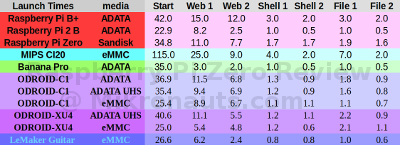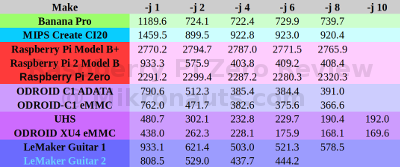Raspberry Pi Zero (PIZERO) Review
Pi Jumper
Pi Jumper is “appropriately sized” 🙂
I used a PC8591 ADC module and wiringPi to test Pi Jumper’s 5V I2C interface.
Actually, I did this test before testing Pi Rtc Dio’s 3.3V I2C MCP23017’s and PC8561.
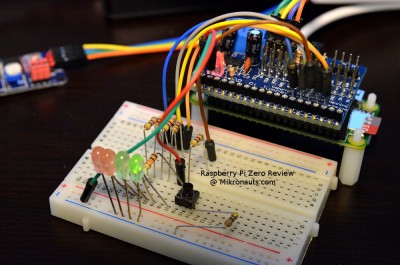
(click on image for larger version)
sudo apt-get install i2c-tools
gcc -o adc adc.c -lwiringpi
just worked!
#include <wiringPi.h> #include <pcf8591.h>void main(int arc, char **argv) {int i;pcf8591Setup ( 100, 0x48);while (1) { for(i=100;i<104;i++) printf("%3d ",analogRead(i)); puts("\n"); delay(1); }}
EZasPi
JPi Zero is tiny!
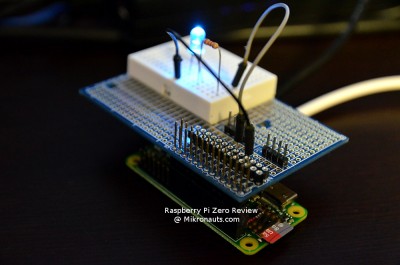
(click on image for larger version)
Just for the heck of it, I repeated the ‘gpio -g 17 1’ test with a small breadboard on EZasPi.
gpio -g mode 17 out
gpio -g write 17 1
gpio -g write 17 0
Benchmarks
Booting & Launching Apps
System boot times and application launch times are very important metrics to users, as they are a measure of how “snappy” a system is.
Different boards tend to use different web and file browsers – which influences the results – and the boot time is influenced by the different kernels and speed of the boot device.
The Raspberry Pi Zero does quite well given that it is an ARMv6 single core SBC.
Compiling GNU Emacs 24.4
Here is a real-world large project compilation in order to show the effect of multiple cores on compiling large software projects.
The chart really shows how much slower single core sbc’s are for compiling large-ish projects.
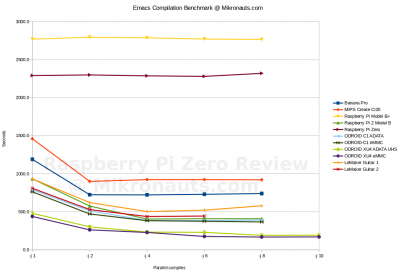
(click on chart for larger version)
Article Index
- Introducing Raspberry Pi Zero
- A Closer Look at Pi Zero
- Feature Comparison, Operating Systems, Software Compatibility
- Common Applications, Multimedia, Kodi, Hardware Compatibility, USB Hubs, WiFi
- Ethernet, GPIO: WiringPi, pigpio, Add-On Board testing, RoboPi
- More testing: Pi Droid Alpha, SchoolBoard ][, Pi Rtc Dio
- More testing: Pi Jumper, EZasPi, Benchmarks: Booting & Launching Apps, Compiling GNU Emacs
- More Benchmarks: SysBench 0.4.12, iperf client & server, NBench 2.2.3
- More Benchmarks: Unix Bench 5.1.3, hdparm, dd, Power Utilization, Documentation
- Support, Conclusion, What I liked, What I did not like
